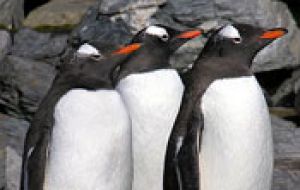MercoPress. South Atlantic News Agency
South Orkney “richer than Galapagos in sea species”

The first comprehensive inventory of the sea and land animals living in a polar region has been carried out by British and German scientists. A team from the British Antarctic Survey (BAS) and Hamburg University found that Antarctica's South Orkney Islands were surprisingly rich in life. More than 1,200 species were counted, including five new to science.
The data, published in the Journal of Biogeography, will help to monitor how the animals respond to future changes. David Barnes, from BAS, said: "This is the first time this has been done, not just anywhere in Antarctica, but anywhere in either polar region." The researchers studied scientific literature dating back more than 100 years, as well as more recent surveys of the land, sea and shores of the archipelago. They concluded that there were 1,224 species in total, of which 1,026 were found in the Antarctic waters - including sea urchins, worms, crustaceans and molluscs. Dr Barnes told BBC News: "There is a widely held belief that life is very rich in the tropics and decreases through temperate areas, through to polar regions, which are thought to be barren. "That is partly because we see life from the land point of view - and when we see the Arctic and Antarctic, we just see ice. "But below the surface of the sea, it is an incredibly rich environment, and diving there is a bit like diving on a coral reef." He added: "If we look at other archipelagos across the globe, that are also isolated we can see that the South Orkney Islands are actually richer than the Galapagos in terms of the number of species we find in the sea." The team also discovered five species that were new to science, including moss-like animals and marine "woodlice". Compared with other surveys in the polar regions, this is a relatively low number. However, finding so few new species was an indication that the team had picked the right spot to survey, said Dr Barnes. He said: "This is some of the best-studied land anywhere in the Antarctic, because there have been biologists on it continuously for decades. "Ironically - when you have a place where you don't find lots of new species, it tells you that you know the life that occurs there fairly well." The scientists will now use the inventory to monitor how this area will respond to future environmental changes. Dr Barnes said: "If we are trying to measure change over time, and try and ascribe different amounts of change to things like response to regional warming or response to ocean acidification, you need to have this kind of baseline and you need to have confidence in that baseline.



Top Comments
Disclaimer & comment rulesCommenting for this story is now closed.
If you have a Facebook account, become a fan and comment on our Facebook Page!